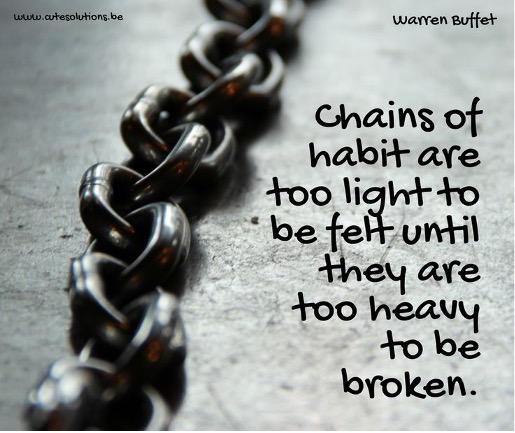Inspired by Warren Buffett’s warning – on why it’s time to unlearn the comfortable
Sequel to: The Gift of Discomfort
Picture this.
You’re in a lecture hall with Warren Buffett. He challenges the class:
“If you could go long on one person in this class—buy 10% of their future earnings—who would it be?”
He encourages you to consider not just intelligence, but character, discipline, and integrity—the habits that lead to success.
Then he flips it:
“Now pick someone to go short on. Someone you think will underperform—not because they lack intelligence, but because they carry invisible habits that will quietly drag them down.”
The room chuckles, but the point is clear.
“The chains of habit are too light to be felt until they are too heavy to be broken.”
Suddenly, it’s not about others—it’s about you.
In my last post, The Gift of Discomfort, I made the case that discomfort is not a problem to be solved, but a signal to be respected.
It’s how we grow. It’s where we learn.
And most importantly—it’s where we become conscious.
But what about the opposite of discomfort?
What about the things that feel so familiar, so embedded, so seemingly harmless… that we stop noticing them entirely?
That’s what Warren Buffett was pointing to when he said:
“The chains of habit are too light to be felt until they are too heavy to be broken.”
Read that quote again! It’s one of the most quietly powerful statements I’ve ever heard. Because it reveals the truth about most of the barriers we face in work and in leadership:
They weren’t built overnight.
They were repeated into existence!
🧐 The trouble with familiar
If discomfort is the signal for change, comfort is the aesthetic that delays it.
Think of the meetings you still run the same way.
The leadership language that’s never been challenged.
The systems and workflows that are working—but no longer working for you.
They’re not “wrong.” They’re just… unexamined.
Buffett’s brilliance is in showing us that these patterns—these habits—don’t feel like chains at first. They feel like rhythm. Like order. Like competence.
And by the time they restrict us?
We’ve already built our identity around them.
🧠 The second layer of unlearning
The Gift of Discomfort was about welcoming stretch.
This? This is about questioning your foundations.
Unlearning doesn’t just live in the big, dramatic change moments.
It lives in the micro-habits.
In the unquestioned defaults.
In the “we’ve always done it this way” reflexes that no longer serve the mission.
This is the second layer of unlearning: the invisible one.
And if you’re a leader, it’s not optional.
It’s your job to make the invisible visible—for yourself, your team, and your culture.
🎮 Why we built Teamvine this way!
In our multiplayer simulations, we see it again and again:
Teams stumble not because they don’t know what to do, but because they don’t see the habits they’re stuck inside.
They miscommunicate.
They default to hierarchy.
They over-rely on logic and under-use empathy.
And when they see it? They shift.
That’s the power of experiential learning—it collapses insight and action into the same moment. It breaks chains while they’re still light.
🧑🏋️ A question worth sitting with!
What habit are you still wearing—simply because it’s familiar?
That’s the invitation.
Not to throw everything out. Not to break what’s working.
But to re-examine what you’re carrying.
Because if Buffett’s right—and I believe he is—then the real risk isn’t what we haven’t learned yet.
It’s what we’ve stopped questioning.
✨ Feel the chain while it’s still light.
Unlearn the comfortable before it costs you clarity.
Because discomfort may be a gift
But familiarity?
Familiarity is a trap.
